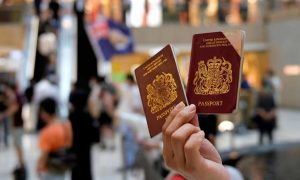 The UK home secretary, Priti Patel, has said she is looking at giving young Hongkongers a new right to come to the UK.
The UK home secretary, Priti Patel, has said she is looking at giving young Hongkongers a new right to come to the UK.
Britain has made an offer of citizenship to 2.9 million people in Hong Kong eligible for a British national overseas (BNO) passport, but this excludes anyone born after 1997.
Patel told the Commons home affairs select committee she was looking actively at the 18-23 age cohort because they were too young to qualify for BNOs. She said the issue was complex but added: “I am giving that commitment to that cohort.”
Young people have been at the forefront of Hong Kong’s pro-democracy demonstrations and are likely to be an early target if the Chinese government makes sweeping arrests.
Patel’s undertaking was welcomed by Nathan Law, the prominent Hong Kong activist who fled to the UK in the wake of China imposing a strict security law last month. He said it was “very important” for Britain to extend BNO status to those too young to qualify for it in their own right and too old to come as dependents of BNO parents.
Law said there protesters as young as 14 had been arrested for taking part in pro-democracy events, and he urged the UK to disregard any criminal record relating to protests when considering people’s suitability for entry. “If they have any record for being indicted when they apply for visa or immigration, they should not be considered or even they should get preferential treatment,” he said.
Law, 27, does not hold BNO status but came to the UK on a regular visa seeking sanctuary from China’s crackdown. He said he had discussed his exile with other activists and would use his current base in London for political advocacy work.
He also suggested that background checks should be carried out to prevent any police or other officials involved in human rights abuses against protesters from gaining access to Britain as BNOs. “People who committed human rights abuses should not be allowed,” he said.
“I am not doing this for myself. I am penniless. I do this for the people that have suffered more than me. We have a sense of obligation and responsibility to this community.”
He said he did not know how long he would stay in the UK.
Law predicted pro-democracy candidates would be disqualified from standing in legislative elections due in September, but if they were not, then they would secure “a sweeping victory”.
Speaking to the Chicago Council on Foreign Relations, Law claimed there had been an irreversible structural change in America’s view of China. “That is not going to be altered by a new president or an election result. It is a very rare bipartisan issue in the US,” he said.
He urged the west to set some parameters in its relationship with China, holding the country accountable for its human rights record. “We cannot allow human rights violations just because we want trade with China. We need a united front. If they refuse to do it, we need counter-measures.
